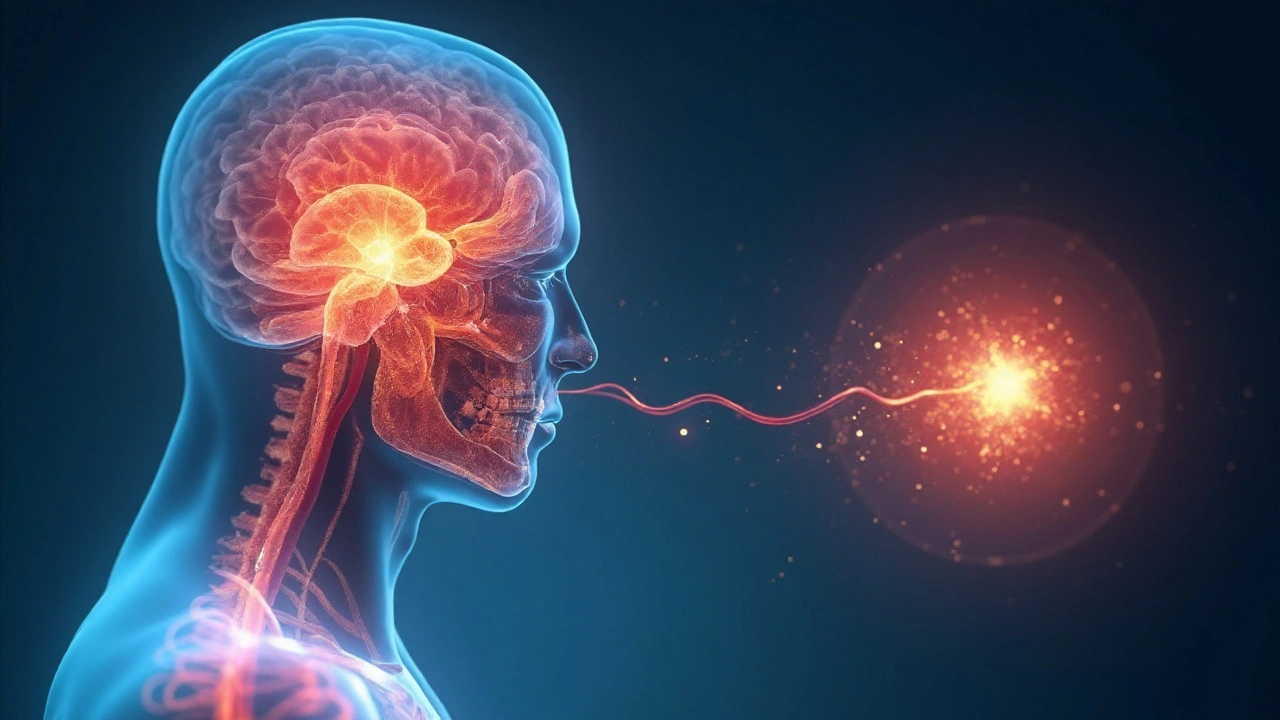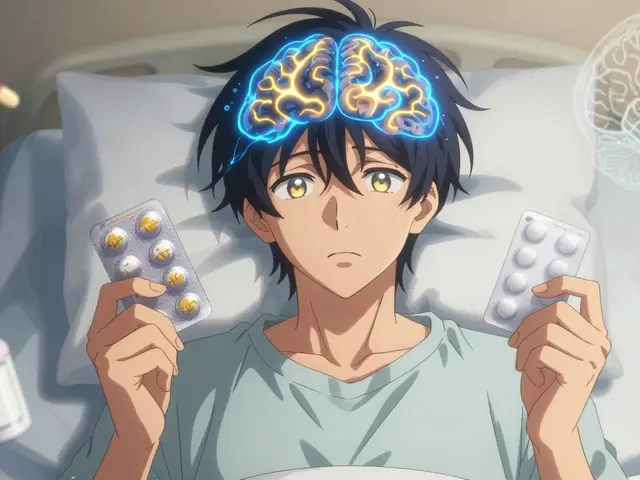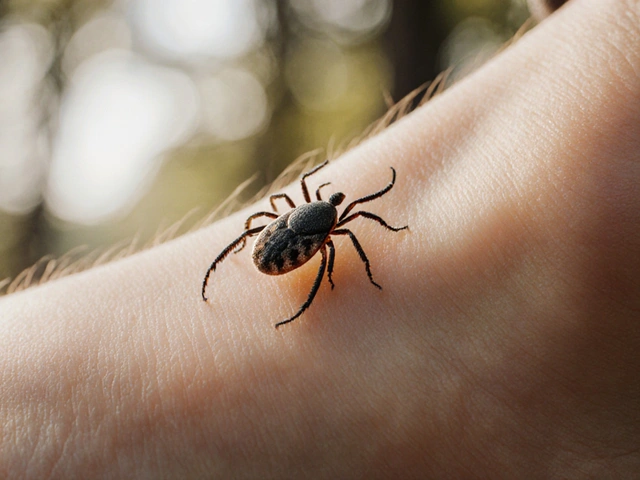Hiccup is a spontaneous, involuntary contraction of the diaphragm followed by a rapid closure of the vocal cords, producing the characteristic "hic" sound. Though often dismissed as a harmless nuisance, hiccups reveal a surprisingly complex interaction between muscles, nerves, and the brain.
How the Hiccup Reflex Works
At the heart of every hiccup lies a simple reflex arc. When the diaphragm the primary breathing muscle separating the thoracic and abdominal cavities contracts suddenly, air is drawn into the lungs. Almost instantly, the vagus nerve a key parasympathetic nerve that innervates the throat, heart, and gut sends a signal to close the glottis, creating the audible click.
The contractile signal travels via the phrenic nerve the motor nerve supplying the diaphragm. Both the vagus and phrenic nerves are part of a larger reflex arc a neural pathway that triggers automatic responses without conscious thought. The brainstem, particularly the medulla, coordinates these signals, acting like a tiny command center that decides whether the event qualifies as a hiccup.
Common Triggers and Their Physiology
Most hiccups are short‑lived and stem from everyday situations that irritate the diaphragm or its nerve supply. Below is a quick snapshot of why these triggers work.
| Trigger Type | Physiological Mechanism | Typical Duration |
|---|---|---|
| Rapid eating or drinking | Stomach distension stimulates vagal afferents | Seconds to minutes |
| Carbonated beverages | Carbon dioxide expands the gastric lumen, irritating the diaphragm | Minutes |
| Sudden temperature change (e.g., ice water) | Cold triggers esophageal spasm, reflexively activating the phrenic nerve | Minutes |
| Emotional stress or excitement | Autonomic nervous system surge affects vagal tone | Variable, often brief |
| Persistent hiccup Hiccups lasting longer than 48 hours | Underlying neurological disorder, metabolic imbalance, or irritation of the diaphragmatic nerves | Days to months |
| Gastroesophageal reflux disease (GERD) Chronic backflow of stomach acid into the esophagus | Acid irritation of the esophageal lining stimulates vagal afferents | Hours to chronic |
Notice how most short‑term hiccups involve the stomach and esophagus, whereas long‑standing episodes often point to nerve irritation or central nervous system dysfunction.
When Hiccups Become Pathological
If a hiccup persists beyond 48 hours, doctors label it persistent hiccup a symptom indicating possible underlying disease. Common culprits include:
- Stroke or brain hemorrhage affecting the medulla
- Multiple sclerosis plaques near the brainstem
- Thoracic cancers that impinge on the phrenic nerve
- Severe GERD acid reflux causing chronic vagal irritation
- Metabolic imbalances such as hyponatremia or uremia
In these cases, simply drinking water won’t help. Treatment often requires addressing the root cause-e.g., corticosteroids for inflammation, anti‑epileptic drugs to calm nerve hyperexcitability, or even surgical decompression of a nerve.

The Brain’s Role: Central Pattern Generator
Neuroscientists have identified a central pattern generator a neural network in the brainstem that orchestrates rhythmic motor activities like breathing and swallowing. This same circuitry can misfire, producing the erratic diaphragmatic bursts we recognize as hiccups. Animal studies (especially in rodents) show that stimulating this generator with electrical pulses reliably triggers hiccup‑like contractions, confirming its pivotal role.
The generator’s activity is modulated by inputs from higher brain regions, which explains why emotional states-fear, laughter, excitement-can provoke hiccups. When the system is overly sensitized, even a minor gastric distension may be enough to set off the reflex.
Managing Hiccups: What Works and Why
Most home remedies revolve around two ideas: resetting the diaphragm’s rhythm or altering vagal tone. Here’s why some popular tricks actually have a scientific basis.
- Holding your breath: Increases CO₂ in the blood, which can dampen the diaphragm’s excitability.
- Drinking a glass of cold water quickly: Swallows air, stretches the esophagus, and briefly overrides the reflex arc.
- Pulling on your tongue: Stimulates the glossopharyngeal nerve, which shares pathways with the vagus, potentially interrupting the hiccup loop.
- Eating a teaspoon of sugar: The grainy texture stimulates oral mechanoreceptors, sending a competing signal to the brainstem.
For persistent hiccups, clinicians may prescribe medications that target the nervous system, such as baclofen (a GABA‑B agonist) or chlorpromazine (a dopamine antagonist). These drugs reduce neuronal firing in the central pattern generator, offering relief when simple tricks fail.
Open Questions & Future Research
Despite centuries of curiosity, many aspects of the hiccup reflex remain unknown. Current research aims to:
- Map the exact neuronal circuits of the central pattern generator using functional MRI.
- Identify genetic variants that predispose certain people to chronic hiccups.
- Develop non‑invasive neuromodulation techniques (e.g., transcutaneous vagus stimulation) as a targeted therapy.
Understanding hiccups better could also shed light on other rhythmical motor disorders, such as sleep‑related breathing irregularities.

Frequently Asked Questions
Why do hiccups happen after eating too fast?
Rapid eating inflates the stomach quickly, stretching its walls. This distension activates vagal afferent fibers, which then trigger the hiccup reflex arc involving the diaphragm and phrenic nerve.
Can stress really cause hiccups?
Yes. Stress spikes sympathetic activity, altering vagal tone and making the central pattern generator more excitable. That heightened state can turn a minor stomach irritation into a full‑blown hiccup.
When should I see a doctor for hiccups?
If hiccups last longer than 48 hours, cause weight loss, disrupt sleep, or are accompanied by chest pain or difficulty breathing, seek medical attention. Persistent hiccups often signal an underlying condition that needs treatment.
What’s the most effective home remedy?
Holding your breath for 10‑20 seconds while gently pulling the tongue upward works for many people because it boosts CO₂ and stimulates competing neural pathways, breaking the hiccup cycle.
Are there medications for chronic hiccups?
Doctors may prescribe baclofen, chlorpromazine, or gabapentin to dampen the central pattern generator’s activity. Treatment is tailored to the underlying cause and patient tolerance.







gladys morante
September 23, 2025 AT 09:27My grandma used to make me drink water upside down and it always worked. Still do it when I get them after soda.
Shawna B
September 24, 2025 AT 07:33Why does sugar work? I tried it once and it just made me cough.
Jerry Ray
September 25, 2025 AT 08:31That’s not how it works. Sugar doesn’t do anything. It’s just distraction. Same as holding your breath. Your brain gets bored and stops the reflex.
Melania Dellavega
September 26, 2025 AT 12:52I’ve always thought hiccups are weird because they’re so universal. Babies get them in the womb. Dogs get them. Even birds seem to hiccup sometimes. It’s like our bodies are stuck with this ancient reflex that never got upgraded. Kinda beautiful in a broken way.
It’s not just a nuisance-it’s a reminder that evolution doesn’t clean up after itself. We’ve got this neural circuit that’s useful for swallowing in reptiles, and now it’s glitching out because we eat too fast or get too excited.
It’s funny how something so small can tie into such a complex system-the vagus nerve, the brainstem, the diaphragm. We think we’re this advanced species, but we’re still running on ancient code.
And yet, we’ve got people trying to cure it with sugar or pulling their tongues. It’s like we’re all amateur neurologists trying to debug our own biology.
I wonder if hiccups are nature’s way of saying, ‘Hey, slow down.’ We’re always rushing-eating, talking, living-and then BAM, our body forces a pause.
Maybe we should be grateful for them. They’re tiny interruptions in a world that never stops.
And honestly, I’ve had some of my best thoughts during a hiccup fit. There’s something about that rhythm that clears your head.
It’s not a flaw. It’s a feature. A glitch in the system that reminds us we’re alive, messy, and beautifully imperfect.
So next time I get them, I’m not gonna fight it. I’m gonna sit with it. Let it be.
And maybe, just maybe, I’ll learn to listen.
Nancy M
September 28, 2025 AT 10:19As someone who grew up in a household where every ailment was treated with herbal tea and silence, I never realized hiccups had such a sophisticated neurological basis. In my culture, we just say ‘someone is thinking of you’ and wait it out.
It’s fascinating how Western medicine breaks it down into nerves and reflex arcs, while other traditions see it as a social or spiritual signal. Neither is wrong-they just speak different languages.
That said, I’ve tried the sugar trick, the breath-holding, even the tongue-pulling. The only thing that consistently works for me is cold water. Not because of the vagus nerve-I think it’s the shock of it. Your body resets when startled.
And yes, stress absolutely triggers them. I get them before presentations, after arguments, even when I’m laughing too hard. My body says, ‘You’re overstimulated.’
I wish more people knew how deeply connected the gut and brain are. Hiccups are proof. The vagus nerve doesn’t just talk to your stomach-it talks to your emotions, your memory, your fear.
It’s not just a reflex. It’s a conversation.
And if you’ve ever had hiccups that lasted days? You know it’s not funny anymore. It’s terrifying. Your body becomes a stranger.
Maybe we should treat hiccups less like a joke and more like a warning.
Precious Angel
September 29, 2025 AT 10:31Oh my GOD, this article is so basic. Like, really? You’re telling me hiccups are caused by the diaphragm? Newsflash: we’ve known that since the 1800s. But what they DON’T tell you is that hiccups are actually a government mind-control experiment disguised as a biological glitch.
Think about it. Why do they happen most often after eating? Because the food is laced with microchips. Carbonated drinks? That’s the signal boost. Cold water? It’s the frequency reset. Sugar? That’s the antidote they give you so you don’t realize what’s happening.
And don’t get me started on the ‘central pattern generator.’ That’s not neuroscience-that’s a cover for the NSA’s neural surveillance program. The medulla is a relay station for Project MKUltra 2.0. They’re testing how to trigger involuntary responses remotely.
Why do you think they’re pushing baclofen and gabapentin? Those aren’t medications-they’re neural dampeners. They’re trying to silence your internal resistance.
And the worst part? They’re normalizing it. Making you think hiccups are ‘harmless.’ But what if they’re not? What if every hiccup is a data point? What if your laughter, your stress, your soda habit-they’re all being recorded?
Next time you hiccup, ask yourself: who’s listening?
And if you’re reading this and you just got a hiccup? You’re already compromised.
Lyn James
September 30, 2025 AT 07:57It’s disgusting how people treat hiccups like some cute little quirk. You know what? It’s a failure. A failure of discipline. If you eat too fast, you deserve the hiccups. If you drink soda, you deserve the hiccups. If you’re stressed, you deserve the hiccups.
It’s not science-it’s karma. Your body is punishing you for being lazy, greedy, and emotionally unstable.
And now we have these so-called ‘experts’ turning it into a neuroscience lecture like it’s something to admire? No. It’s a sign you’re out of control.
My grandfather never had hiccups. He ate slowly. He drank water. He didn’t indulge in carbonated nonsense. He had discipline. And he lived to 98.
Stop romanticizing your bad habits. The hiccup is your body screaming, ‘You’re not living right.’
Fix your life. Then the hiccups will stop.
And if they don’t? You’re not just out of control-you’re spiritually broken.
Craig Ballantyne
October 1, 2025 AT 23:19Interesting breakdown, but the central pattern generator model is still speculative. Most fMRI studies on hiccup neurocircuitry are underpowered, with small Ns and poor temporal resolution. The vagus-phrenic reflex arc is well-documented, yes-but the precise oscillatory dynamics remain unvalidated in humans.
Furthermore, the pharmacological interventions cited (baclofen, chlorpromazine) are off-label and carry significant side effect profiles. Their efficacy is anecdotal in chronic cases, with no RCTs establishing standardized protocols.
Also, the claim that ‘holding breath increases CO₂’ is oversimplified. The hypercapnic threshold varies across individuals, and breath-holding duration rarely reaches the threshold needed for central chemoreceptor modulation.
What’s missing here is a discussion of inter-individual variability in vagal tone, autonomic reactivity, and diaphragmatic sensitivity. Hiccups are not a monolithic phenomenon-they’re a spectrum.
Until we have longitudinal neurophysiological data across diverse populations, we’re just decorating ignorance with jargon.
Krys Freeman
October 3, 2025 AT 07:01So we’re spending time on this? We got wars, inflation, and bad Wi-Fi, and you’re writing a thesis on hiccups?
David Ross
October 4, 2025 AT 14:03Actually, the phrenic nerve originates from C3-C5, not C4 alone-so your article’s phrasing is technically inaccurate. And the vagus nerve doesn’t ‘send a signal to close the glottis’-it’s the nucleus ambiguus that integrates the input and activates the recurrent laryngeal nerve. You’re conflating anatomy with physiology.
Also, ‘carbon dioxide expands the gastric lumen’? No. CO₂ dissolves into carbonic acid, which then dissociates-gas is produced as a byproduct of fermentation, not direct expansion. This is basic biochemistry.
And why are you calling it a ‘central pattern generator’ like it’s a proven fact? It’s a theoretical construct. We’ve never mapped it in a living human.
People like you make science look like fiction.
Sophia Lyateva
October 5, 2025 AT 21:24hiccups r caused by aliens. they use the vagus nerve to send messages. that’s why sugar works-its like a jam signal. they dont like sweet things. i got hiccups after eating ice cream and they stopped. proof.
AARON HERNANDEZ ZAVALA
October 6, 2025 AT 00:18I’ve had hiccups for three days once. Didn’t know what was happening. Thought I was dying. Turns out it was GERD. I didn’t even know I had it.
After that, I stopped eating late. Stopped drinking soda. Started walking after meals.
It’s not magic. It’s just listening to your body. Not everything needs a complex explanation. Sometimes it’s just… you’re doing something wrong.
And that’s okay. We all mess up.
Maybe hiccups aren’t a glitch. Maybe they’re a nudge.
Bethany Hosier
October 7, 2025 AT 13:23Wait. If hiccups are caused by the vagus nerve, and the vagus nerve connects to the heart, then… are hiccups a sign that your heart is being monitored? I’ve noticed mine happen right after I use my phone. Coincidence? I don’t think so. The 5G network is pulsing through the vagus. They’re tracking emotional responses through involuntary spasms. This isn’t science-it’s surveillance.
And why do you think they’re pushing ‘medications’? To mask the symptoms so we don’t notice the signal. The real cure is turning off your devices. And maybe wearing a Faraday hat.
I’ve stopped using my phone after 6 PM. No hiccups since.
They’re watching. They’re listening. And they’re using your diaphragm to collect data.
Jerry Ray
October 8, 2025 AT 20:33Wait, so you’re saying sugar works because of mechanoreceptors? That’s the dumbest thing I’ve read all week. You’re telling me a grain of sugar is somehow smarter than a neural circuit? Please. It’s placebo. You think it works because you believe it works. Same with holding your breath. You’re just distracting yourself.
And if you actually believed in this ‘central pattern generator’ nonsense, you’d know it’s not something you can ‘reset’ with sugar or water. It’s a neural oscillator. It doesn’t care about your home remedies.
People love magic fixes. Makes them feel in control. But biology doesn’t care how you feel.